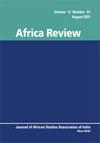Building a transformative feminist movement for women empowerment in Tanzania: the role of the Tanzania Gender Networking Programme (TGNP-Mtandao)
IF 0.5
Q4 AREA STUDIES
引用次数: 1
Abstract
ABSTRACT Tanzania has, over the past two decades, made remarkable progress in terms of women’s representation in the parliament. In the women in parliament rankings, Tanzania comes 23rd in the world and the 8th in Africa with 36.6% Members of Parliament. This achievement is largely a result of struggles by the women’s movement in which a transformative feminist organization namely the Tanzania Gender Networking Programme (TGNP-Mtandao) is clearly singled out to have played a leading role. This paper provides a critical assessment of the contribution of TGNP-Mtandao in promoting women’s representation and participation in decision-making processes in Tanzania. Specifically, it focuses to understand how TGNP’s leadership style contributed change in the rules of the game towards the achievement of gender equality and women’s political empowerment. In order to accomplish this endeavour, this work employed qualitative research so as to gain an in-depth understanding of gender issues in Tanzania’s context. Data were collected mainly through interviews with key stakeholders from parliamentarians and non-governmental organizations. Moreover, election reports, evaluation reports, gender reports, and legislations were reviewed to provide secondary data.在坦桑尼亚为妇女赋权建立变革的女权主义运动:坦桑尼亚性别网络计划的作用
在过去的二十年中,坦桑尼亚在妇女在议会中的代表地位方面取得了显著的进步。在议会女性排名中,坦桑尼亚在世界上排名第23位,在非洲排名第8位,议会成员占36.6%。这一成就主要是妇女运动斗争的结果,其中一个具有变革意义的女权主义组织,即坦桑尼亚性别联网方案(TGNP-Mtandao)显然发挥了领导作用。本文对TGNP-Mtandao在促进坦桑尼亚妇女代表和参与决策过程方面的贡献进行了批判性评估。具体而言,它侧重于了解TGNP的领导风格如何促成游戏规则的变化,以实现性别平等和妇女的政治赋权。为了完成这项工作,这项工作采用了定性研究,以便深入了解坦桑尼亚的性别问题。数据主要通过与议员和非政府组织的主要利益攸关方的访谈收集。此外,还审查了选举报告、评价报告、性别报告和立法,以提供第二手数据。
本文章由计算机程序翻译,如有差异,请以英文原文为准。
求助全文
约1分钟内获得全文
求助全文
来源期刊

Africa Review
AREA STUDIES-
CiteScore
1.80
自引率
12.50%
发文量
22
期刊介绍:
Africa Review is an interdisciplinary academic journal of the African Studies Association of India (ASA India) and focuses on theoretical, historical, literary and developmental enquiries related to African affairs. The central aim of the journal is to promote a scholarly understanding of developments and change in Africa, publishing both original scholarship on developments in individual countries as well as comparative analyses examining the wider region. The journal serves the full spectrum of social science disciplinary communities, including anthropology, archaeology, history, law, sociology, demography, development studies, economics, education, gender studies, industrial relations, literature, politics and urban studies.
 求助内容:
求助内容: 应助结果提醒方式:
应助结果提醒方式:


